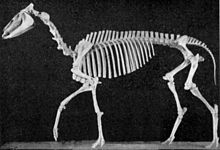| Hypohippus Temporal range: Barstovian-Clarendonian ~15.97–10.3 Ma PreꞒ Ꞓ O S D C P T J K Pg N | |
|---|---|

| |
| Hypohippus osborni skeleton | |
| Scientific classification | |
| Domain: | Eukaryota |
| Kingdom: | Animalia |
| Phylum: | Chordata |
| Class: | Mammalia |
| Order: | Perissodactyla |
| Family: | Equidae |
| Subfamily: | †Anchitheriinae |
| Genus: | †Hypohippus Leidy, 1858 |
| Species | |
| |
Hypohippus (Greek: "under" (hypos), "horse" (hippos)) is an extinct genus of three-toed horse, which lived 17–11 million years ago. It was the largest anchitherine equid about the size of a modern domestic horse, at 403–600 kg (888–1,323 lb) and 1.8 m (5.9 ft) long. It was a long-necked, high-shouldered browser with sub-hypsodont, lophodont (rhino-like) dentition, that fed on the tough vegetation of forest understory and shrubs. Its deep preorbital fossae and retraction of the nasal notch hint at the presence of a long, muscular and prehensile upper lip that would aid during selective browsing. Overall its ecology would have been more comparable to modern okapi than to grazing horses. Fossils of it have been found in Nebraska, Colorado, and Montana.
-
 20th century restoration by Heinrich Harder.
20th century restoration by Heinrich Harder.
-
 Life restoration showing a prominent, prehensile upper lip.
Life restoration showing a prominent, prehensile upper lip.
References
- "Glossary. American Museum of Natural History". Archived from the original on 20 November 2021.
- Janis, C. M.; Damuth, J.; Theodor, J. M. (2002). "The origins and evolution of the North American grassland biome: The story from the hoofed mammals". Palaeogeography, Palaeoclimatology, Palaeoecology. 177 (1–2): 183–198. Bibcode:2002PPP...177..183J. doi:10.1016/S0031-0182(01)00359-5.
- Bruce J. MacFadden (1992). Fossil Horses: Systematics, Paleobiology, and Evolution of the Family Equidae. Cambridge University Press. p. 284. ISBN 0521477085. Retrieved 21 September 2022.
- Christine M. Janis (1998). Evolution of Tertiary Mammals of North America: Volume 1, Terrestrial, Carnivores, Ungulates and Ungulate-like mammals. Cambridge University Press. p. 545. ISBN 9780521355193. Retrieved 21 September 2022.
- Evans, J. W.; Bennett, Debb (2008). The Elsevier World Animal Science Encyclopedia (PDF). pp. 1–37.
- Hypohippus
- "Hypohippus". Florida Museum. 2018-02-16. Retrieved 2021-08-14.
| Extinct genera of Equidae (Horse family), arranged by subfamily | |||||||||
|---|---|---|---|---|---|---|---|---|---|
| |||||||||
| Basal forms | |||||||||
| Anchitheriinae | |||||||||
| Equinae |
| ||||||||
| Taxon identifiers | |
|---|---|
| Hypohippus | |
This equine-related article is a stub. You can help Misplaced Pages by expanding it. |
This prehistoric odd-toed ungulate-related article is a stub. You can help Misplaced Pages by expanding it. |








